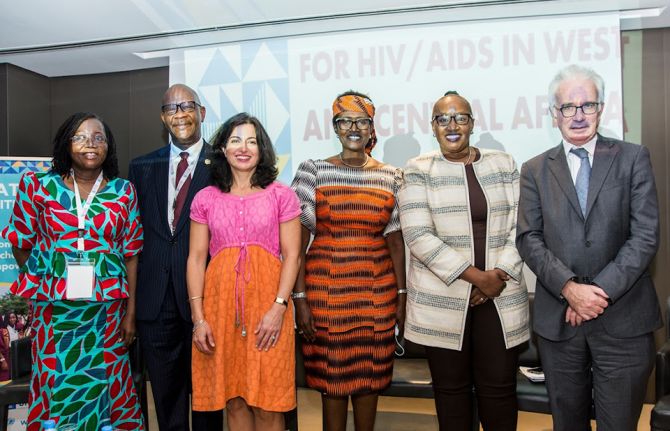

Feature Story
Funding the AIDS response and reforming health systems in western and central Africa
03 November 2021
03 November 2021 03 November 2021During the West and Central Africa Summit on HIV in Dakar, several international partners and ministers gathered to discuss the pressing situation around health financing in the region, exacerbated by the economic crisis due to COVID-19. When it comes to funding HIV responses, WCA is facing a perfect storm: resources available for HIV in the region in 2020 were approximately three quarters of the amount needed. In addition, total HIV resources in the region declined by 11% in the last decade. While PEPFAR and the Global Fund have increased their commitments to the region, domestic resources have slowed down since 2018 and dropped dramatically in 2020.
COVID-19 epidemic did not help. Most African governments have responded to the economic shock by increasing government spending last year however, but with revenues hit by the slow-down, the pandemic will leave many countries with large deficits and unmanageable debts.
Winnie Byanyima, UNAIDS Executive Director, stressed the importance of focusing on these challenges by also re-thinking and reforming overall health systems. She urged countries, as did many other panellists, to use dwindling funds more efficiently, and to ensure additional resources be dedicated to health. “Healthy people means healthy economies,” she said. She also called for more space to be given urgently to community-led services.
“We need to properly fund community infrastructure and response to be strongly integrated with formal health systems. This is critical as we think about preparing and coping with future pandemics,” Ms Byanyima said.
PEPFAR Deputy Coordinator for Multi-Sector Relations Mamadi Yilla wholeheartedly agreed. "COVID-19 acted like a catalyst and everyone recognized civil society’s role in getting services to the people,” she said. Mentioning that PEPFAR has invested billions in Africa since 2003, she said that the partnerships have to be re-invented and urged governments to work hand in hand with civil society as well as deploy funds in a targeted fashion.
“We have to challenge ourselves to make each dollar count,” said Global Fund Executive Director Peter Sands, "COVID-19 has indeed highlighted the obvious: investing in health makes sense.” He added, “It is important to have finance and economic ministers as part of the answer because health ministers will not be able to solve this on their own.”
Recognizing the need for increased domestic spending on health, the Senegalese Minister of Economy, Planning and Cooperation, Amadou Hott, noted that the current economic slump limits countries' ability to invest more of their resources in the sector. He, like Ms Byanyima, said additional resources must be drawn from debt cancellation, additional international financing mechanisms such as augmenting international liquidity (Special Drawing Rights (SDRS) from the IMF), and fight tax evasion to help increase domestic tax collection.
The Sierra Leone Health Minister, Austin Demby, said that earmarking disease specific resources does not build sustainable health systems, citing an example of a recent measles outbreak in his country. He had to immediately deploy funds to contain it. “We have to create broader platforms to be more flexible,” he said. “Make sure some of the systems around community engagement, and services used every day for HIV, tuberculosis, and malaria can be used for other diseases.”
In addition, financing shouldn’t be tied to specific implementing partners. Both Ministers stressed that to transform health systems, they needed to be given more leeway to implement models that can be self-sustaining on domestic resources, which was not currently the case.
Finally, climate change must be taken into account as it impacts the planet and inevitably people’s wellbeing. The West and Central Africa region, hit hard by desertification and drought, will only feel more pressure on already overwrought health systems.
“Linking funding for climate change and health is crucial because one will inevitably impact the other and increase vulnerabilities to pandemics and diseases,” Mr Hott said in his closing remarks.



